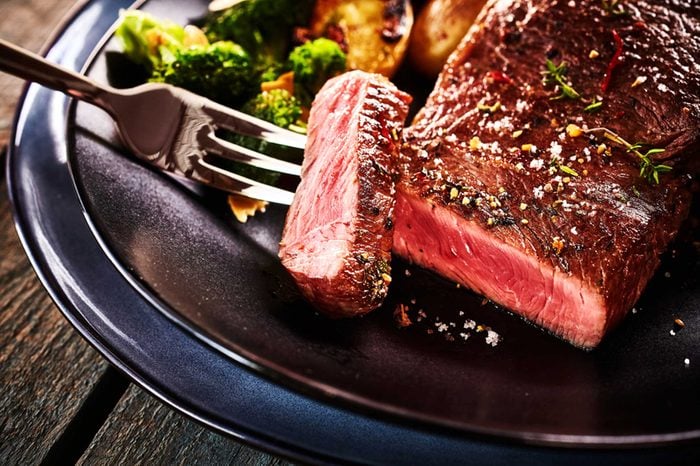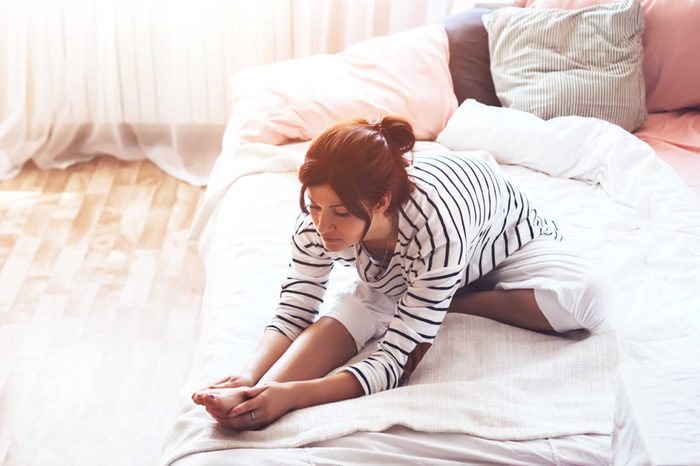What causes belly bloat?
Waking up with a bloated stomach is not a good feeling. But before you start blaming your puffy tummy on gas or PMS, you should know that bloating can also be a side effect of other conditions like diarrhea, constipation, irritable bowel syndrome, or a food allergy or intolerance. For persistent belly bloat, seek a physician’s advice to get the help you need.

Eat at the dinner table
Lounging in bed while snacking is the perfect recipe for morning bloat. “If you lay down at night to munch, that allows gas to go down into your lower abdomen,” says James Reynolds, MD, professor of clinical medicine at University of Pennsylvania’s Perelman School of Medicine in Philadelphia, Pennsylvani. You should be sitting upright when you eat so if you do swallow excess air, it encourages the gas to go up and out versus down and in.” You should also eat slowly and avoid gulping your drink during your meals; inhaling your food and drinking while you eat can also increase air intake and up your risk for developing gas later on. Consuming vegetables like asparagus, bok choy, and celery throughout the day are great options for keeping your belly bloat-free.

Give your belly a massage
Mom might have been onto something when she rubbed your belly as a kid to soothe a tummy ache. Sometimes bloating can be caused by constipation or problems in the gut, so gently massaging your stomach in bed may actually help move things along overnight. It increases your motility to move your hands along your gastrointestinal tract,” says gastroenterologist Judy Nee, MD, assistant professor of medicine at Beth Israel Deaconess Medical Center in Boston. Press along your colon, going from the right side of your lower abdomen up into your stomach area and down to the left side; this follows the path of the gastrointestinal tract. Dr. Nee tells her patients to write out “I [heart] U” across their stomachs to ensure they massage their gastrointestinal tract in its entirety. Banishing belly bloat isn’t the only surprising benefit of a massage.

Avoid taking vitamins before bed
Some vitamin supplements have earned a bad rap for increased belly bloat because of certain ingredients. “Certain vitamin supplements have non-absorbable sugar alcohols like sorbitol and xylitol syrups in them,” says Alan Brijbassie, MD, a gastroenterologist at Sentara Martha Jefferson Medical & Surgical Associates in Charlottesville, VA. “These are non-digestible.” Since our body has trouble digesting sugar alcohols, additives, and fillers found in some supplements, our gut bacteria have more time to feast on them and produce gas. A good ingredient label is typically short and sweet with easy-to-pronounce words that you know—if it looks like gibberish, chances are it contains additives or fillers. Steer clear of vitamins that list sugar alcohols, lactose, and gluten as the ingredients (they may disguise them under words like food starch or wheat germ). An even better bet: get your vitamins and minerals from natural sources by eating a well-balanced diet. Get the lowdown on the eight most common vitamin supplements.

Do a low-intensity bedtime workout
A small dose of light to moderate exercise before bed may just be the ticket to moving things along overnight and quelling any morning belly bloat. “Walking around or doing light exercise for 15 minutes after you eat increases your motility and moves the gastrointestinal tract along to help that feeling of bloating,” says Dr. Nee. Try taking a 15-minute stroll around the neighborhood after dinner or do some light yoga poses to relieve your digestive discomfort. Here’s how you can walk your way to weight loss.

Color in an adult coloring book
Stressing about that upcoming work presentation or job interview can put a real damper on your mood, hair, skin, heart, weight, and even your belly. Your gut is extremely vulnerable to stress, which can cause changes in your motility and inflame your intestines, giving you that puffy, uncomfortable sensation in your stomach. Before bed, take a half-hour to decompress and rid your mind of any negativity or worries. Reading a book, writing in a journal, or dumping out the crayons to color in an adult coloring book are just a few ways to put your mind—and stomach—at ease.

Skip the nightcap
“Carbonated beverages and beer are the two biggest culprits of bloating,” says Dr. Brijbassie. “Stay away from drinking those at least two hours before bed.” Even better? Avoid all alcohol and food at least two hours before bed to give your digestive system a rest. It takes at least two to three hours for your stomach to empty itself out and laying down while your digestive enzymes are at work pulls the gas further into your abdomen. A slim and trim tummy is just one of the many perks of cutting back on the booze.

Drink peppermint tea
Peppermint isn’t just reserved for minty fresh breath—it may also help relax the gastrointestinal tract and alleviate bloating. “A lot of the proof is anecdotal but it does help some people,” says Dr. Brijbassie. “Peppermint oil [mixed with a little water] may also help the digestive enzymes break down food better.” Simply mix two to three drops of peppermint oil with a cup of hot water and drink up! But avoid sucking on peppermint candies or chewing gum because they may be loaded with sugar alcohols, which the bacteria in the small bowel ferments to produce gas and bloating. If you don’t consider yourself a peppermint person, try taking some artichoke leaf extract before bed.